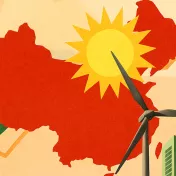The year 2019 will be key for future climate policy in Germany and Europe. Finance plays a key role in improving climate protection and sustainable growth.
To this end, Germany should learn from pioneering countries for "Green Finance". In the seven articles in our series, international authors will therefore explain their country's approach towards a green financial system, addressing opportunities, hurdles and unanswered questions.
Financing sustainability or sustainable financing?
The small country in the heart of Europe portraits itself as a leader in "sustainable finance". Already in 2007, the first green bonds were issued and now there is also a "green" stock exchange. However, demand and reality do not coincide enough.
Alternative banks, which try to finance sustainably, such as the association for alternative financing etika and the savings bank Banque et Caisse d’Epargne del’Etat BCEE, have existed for some time now in Luxembourg. However, their activities in the real economy are currently overshadowed by a mainstreaming of the term "Sustainable Finance". Now, the term focuses on the financial market, meaning investment instead of retail banking. The debate about this newer, financial market-oriented term has picked up speed in Luxembourg since 2007. One reason was the issuing of the first green bonds by the European Investment Bank (EIB), which is located in Luxembourg.
The difference between "green" and "sustainable" should be noted: "Green" financial products consider mostly ecological, especially climate criteria, while "sustainable" financial products should consider more aspects, such as social and governance criteria.
The financial sector and its supervisors only want to finance sustainability – this is not the same as financing sustainability. Sustainable financing or sustainability in its classical sense means to establish systemic stability and reproductive capacity of the financial sector itself – considerations which are not existent in the current debate. Supervision and regulation remain within the Financial Stability Board, the European Central Bank as well as national authorities:
Since 2008, this has not only led to successes such as the increase in the number of supervisory staff and their Europeanisation or the improvement of the capital structure of banks. It has also led to failures such as the lack of unbundling systemically important banks or the strengthening of the shadow banking sector. In some cases, rules introduced have even been withdrawn.
Luxemburg’s efforts in financing sustainability
With its 44,000 employees, the financial sector contributes to 35% of national GDP. This makes it the central sector of Luxembourg's economy. The coalition between liberals, social democrats and the green party, which has been governing since 2013, commissioned a study about the future of Luxembourg’s economy in 2016. It recommended to establish a platform to finance sustainable development. Following both, this recommendation and the Paris Climate Agreement adopted in 2015, a strong national effort to make the financial center more sustainable emerged. In a participatory process including diverse actors from the field of finances, the "Luxemburg Sustainable Finance Roadmap" was developed. Key elements are: to develop a national strategy, to raise awareness, to establish a coordination unit, to increase the supply of sustainable financial products, and to establish public private partnerships (e.g. at the FCCF, Forestry and Climate Change Fund). Last but not least, governmental and non-governmental actors should work together on the classification of products and regulations.
"We don’t want to wait for the train from Brussels!"
Besides this first trailblazing report, there are many other initiatives for sustainable finance in Luxembourg: The Ministries for Environment and Finance and the EIB jointly built a "Climate Finance Platform", in 2016 Luxembourg’s stock market got a green branch, which allows to trade green and social bonds. Further, Luxembourg is a member of the network and Luxembourg’s central bank is also pursuing activities in this field.
The omnipresence of the topic is seen in the high number of initiatives and numerous conferences, publications; and especially in the activities of LuxFlag, an initiative of the financial center for labeling sustainable products.
Here in Luxembourg "we don’t want to wait for the train from Brussels" – the Financial Minister Pierre Gramegna recently said at a conference about the national Sustainable Finance Roadmap. Instead he aims to take a proactive approach in order to be able to influence the timetable of the train in the sense of his own interests- instead of waiting for the directions from the EU's Action Plan on Sustainable Finance.
What does sustainability mean for Luxembourg's strong financial industry?
While France protects its nuclear industry with eagle eyes as Germany does with its car industry, Luxembourg’s counterpart is its financial industry. The country therefore sees itself rather a supporter of the financial center than an emancipated actor demanding its contributions. The principle to socialize losses and privatize profits has not changed since the financial crisis ten years ago (one example is the FCCF mentioned above, where the state functions as venture capitalist). Also current regulations for matters of the environment are insufficient: So far, only 6% of traded fonds are green. Strong political signals are needed if the (financial) economy is to be transformed in a truly sustainable manner

Foto: etika asbl
| Alexander Feldmann is project manager at etika. Etika is a registered association with the aim of promoting alternative financing and providing food for thought for the development of ethical money management. |

With the financial support of Stiftung Mercator. The author and Germanwatch are responsible for the content.
The blog post was first published at www.klimareporter.de.




